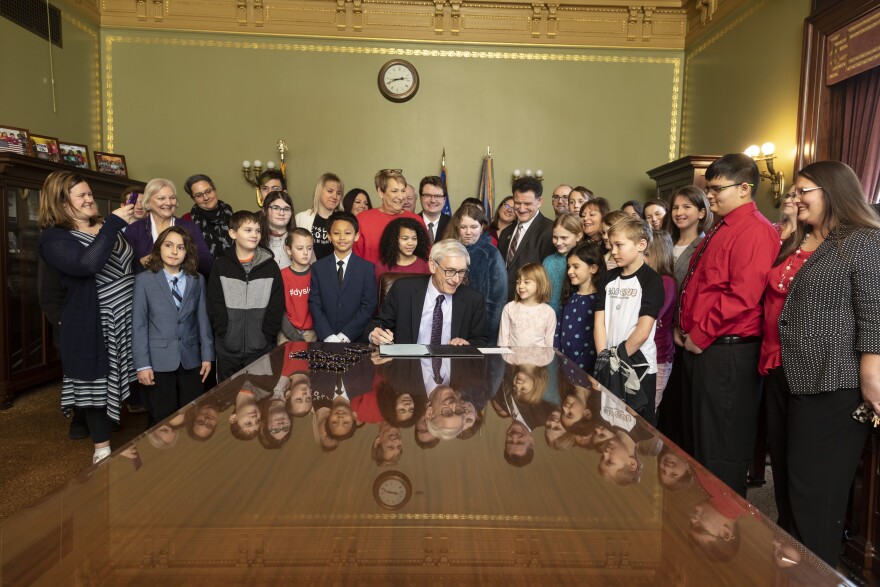Wisconsin now has its first dyslexia-specific law on the books — giving hope to advocates who’ve been fighting for greater recognition of the common learning disability.
Act 86 calls for the creation of a dyslexia guidebook for school districts. Gov. Tony Evers signed the bill into law Wednesday morning, tying it to Wisconsin’s push to improve students’ reading abilities.
This comes amid a national discussion about why reading outcomes are stagnant in so many states, including Wisconsin.
Kari Baumann is one of the Wisconsin parents who have been leading the charge for state action on dyslexia. Baumann’s 10-year-old son, Grady, is dyslexic. For years, he struggled to read, until his family took him to specialized tutors. Baumann says with their help, Grady jumped from a pre-kindergarten reading level to fourth grade level.
READ: Families Call On Wisconsin Lawmakers To Take Action On Dyslexia
“Along with the growth of reading, his confidence and his ability to enjoy life, and just be part of going shopping and reading a menu at a restaurant, all of that grew with him,” Baumann said. “It’s a miracle to see. At one point we just weren’t sure what his future held for him because he was struggling so bad.”

It’s a common story for parents of dyslexic children. Like Baumann, many seek resources outside of their school districts to get the help they need.
Dyslexia is a learning disability in which a student has difficulty connecting written words to spoken language. Research shows these students especially benefit when teachers use systematic, explicit phonics instruction that trains students to decode the sounds that letters make.
But there has been debate about whether a phonics-heavy approach is the best way to teach reading. Some call it "the reading wars."
“This really is not a conclusion of the reading wars, but certainly a first step that says [dyslexia] exists,” said Rep. Bob Kulp, who authored the dyslexia bill signed into law Wednesday. “And we can’t just continue to say that all kids learn to read if you put them in a bath of books and surround them with awesome literature and read to them.”
READ: Reading Instruction Debate Holds Back Wisconsin Dyslexia Legislation
Act 86 mandates the Department of Public Instruction convene a task force, which would create a dyslexia guidebook. School districts, parents and teachers could turn to the guidebook for answers about dyslexia. The task force would include representatives from the Wisconsin State Reading Association, a professional organization that was opposed to the bill that became Act 86.
In an email, WSRA spokesman Norman Andrews said the organization still has doubts about the new law.
“WSRA still has concerns that dyslexia is but one of many factors that could affect a child's ability to read,” Andrews said. “WSRA believes a guidebook should provide information on the many factors that could contribute to reading difficulties to ensure we educate parents, teachers, and administrators on the issue of reading difficulties.”
"This really is not a conclusion of the reading wars, but certainly a first step that says [dyslexia] exists." - Rep. Bob Kulp
Dyslexia advocates were unsure about whether Evers would support the guidebook bill because a number of legislators from his party opposed it.
READ: Wisconsin Dyslexia Bill Advances Amid Partisan Disagreement
In a statement, Evers told WUWM that Act 86 “adds one more tool in the toolbox for educators across our state to increase reading proficiency.”
“The one skepticism I have is this guidebook isn’t enough,” said Baumann, who works with the parent advocacy group Decoding Dyslexia. “It’s like OK, we’ve got this one step. Now we need to go farther.”
Kulp and other legislators have introduced several additional bills related to dyslexia and reading instruction. Those bills would actually force changes in school districts and teacher preparation programs. But Kulp says it’s unlikely the legislation will make it through this session.
“Act 86 is a good first step and it very likely is the only one that will be signed into law this session,” the Republican from Stratford told WUWM. Kulp is retiring this year. But he says he’s confident other lawmakers will continue to push for changes to help struggling readers.
The momentum isn’t confined to the Legislature. In January, DPI Superintendent Carolyn Stanford Taylor – the top education official in Wisconsin – said her department is making changes. Stanford Taylor endorsed explicit phonics instruction as a key component of early reading education.
But again, it’s unclear how that will translate to changes on the ground, in schools where dyslexic students may be falling behind in reading.
Have a question about education you'd like WUWM's Emily Files to dig into? Submit it below.
_





